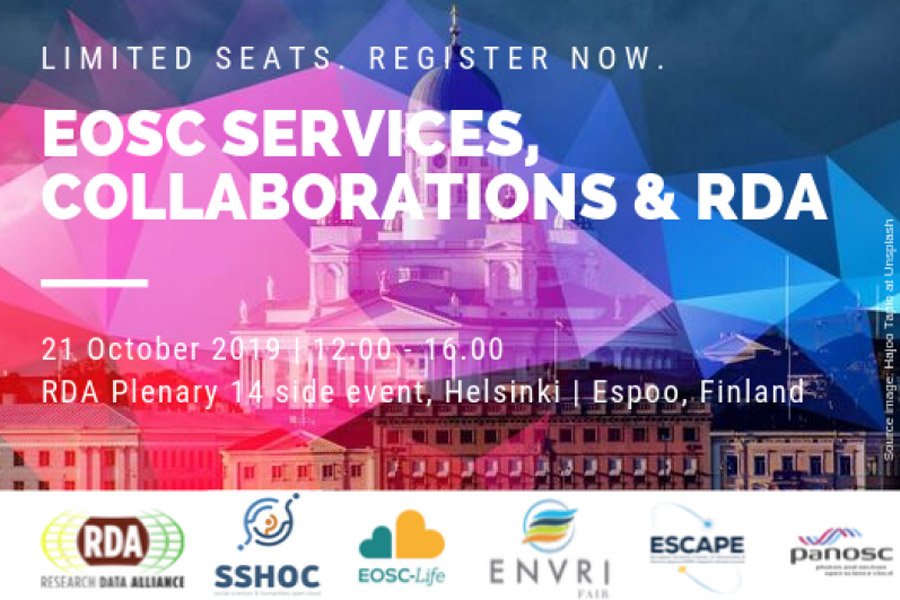
Oct 21, 2019 to Oct 22, 2019
|
Conferences & Events

Data Makes the Difference
ESCAPE was represented at the Research Data Alliance (RDA)* 14th Plenary preliminary events in Helsinki, Finland on 21-22 October. These events brought together data experts in research, industry and policy-making from all around the world and from all disciplines under the theme Data Makes the Difference.
Data has enormous and diverse potential to change how we work, make decisions and empower citizens. The 14th RDA plenary has explored the extensive ways data can make the difference by bringing together diverse group of experts from all around the globe. During the plenary participants shared and learned together and advance their abilities to use data in making a positive impact in the world to tackle its complex challenges.
EOSC Services, Collaborations, and the RDA
On Monday 21st October, ESCAPE was represented at the RDA side event “EOSC Services, Collaborations, and the RDA” . This side event was organized by H2020-SSHOC to discuss commonalities and collaborative solutions for community research data services. This discussion forum focused on the technical, social and governance issues. Following five European Strategy Forum on Research Infrastructures (ESFRI) cluster projects were invited to present their vision of the European Open Science Cloud (EOSC) :
Marco Molinaro, from ESCAPE, introduced the participants with Virtual Observatory and role of the EuroVO in gathering European Contributions to the virtual observatory. He explained how VO is an essential component for the astronomy datasets facilitating interoperability and re-use of data. ESCAPE aims to demonstrate that the VO framework can be integrated within the EOSC.
ACCESS MARCO MOLINARO PRESENTATION HERE
The International Research Data Community contributing to EOSC
ESCAPE was also represented at another major event "The International Research Data Community contributing to EOSC". Organized by the EOSC secretariat on the 22nd October, this event gathered among 200 participants from all around the world.
Hans-Josef Linkens, Governing Board Chair and German Federal Ministry of Education and Research emphasized on the importance of the EOSC governance board subgroups (Compatibility, regulatory framework and data) and the strategic approach of the governance board. He also mentioned the key debate issues in the governance board which are the sustainability of the EOSC as well as the finance and business model of EOSC (strawman report). He also stressed on the importance of the strategic partnerships (co-programmed/ co-funded) between the member states and the EC. The EOSC governance board is also discussing if EOSC will be included in the upcoming framework programme.
Karel Luyben, CESAER and Chair of the EOSC Executive Board presented following key updates from the EOSC executive board.
EOSC working plan 2019-2020 was also released on this occasion. This document is available on http://doi.org/10.2777/972843 .
Jean-François Abramatic, Architecture WG Chair mentioned that the AAI and PID policy are the priorities for the Architecture WG to provide EOSC access to millions of European researchers. PIDs will be the important elements of the EOSC as it would provide scientists with an efficient search capability. Architecture WG will work with FAIR WG to identify various PIDs used in different scientific domains. Inputs from projects such as GEDE, FREYA will be used as guidelines to define the PID policy. An initial PID policy is expected to be released by the end of 2019. Participants were informed about the next architecture working group meeting at the PIDapalooza event which will take place in January 2020 in Lisbon.
Rupert Lueck, Sustainability WG chair discussed that the dialogue between member states and the EC should be able to address the funding and business model in the near future.
For Rules of Participation (RoP) WG the challenges are to define how to optimize the rules of participation standard without compromising the quality of services while encouraging participation, said Juan Bicarregui, Rules of Participation (Rop) WG Chair.
Sarah Jones, FAIR WG chair mentioned the importance of interoperability. She also discussed the RDA FAIR Data Maturity Model Working Group which is providing recommendations on metrics and certifications.
All the inputs received during the discussions will be also used to shape the upcoming EOSC Symposium event, on 26-28 November 2019, in Budapest, Hungary.
*Research Data Alliance (RDA) - With over 8800 members and 87 working & interest groups, of which 25+ domain specific, RDA is the strategic partner to represent the research data community for EOSC. And to achieve progress in thematic areas that need a global approach in a common framework.